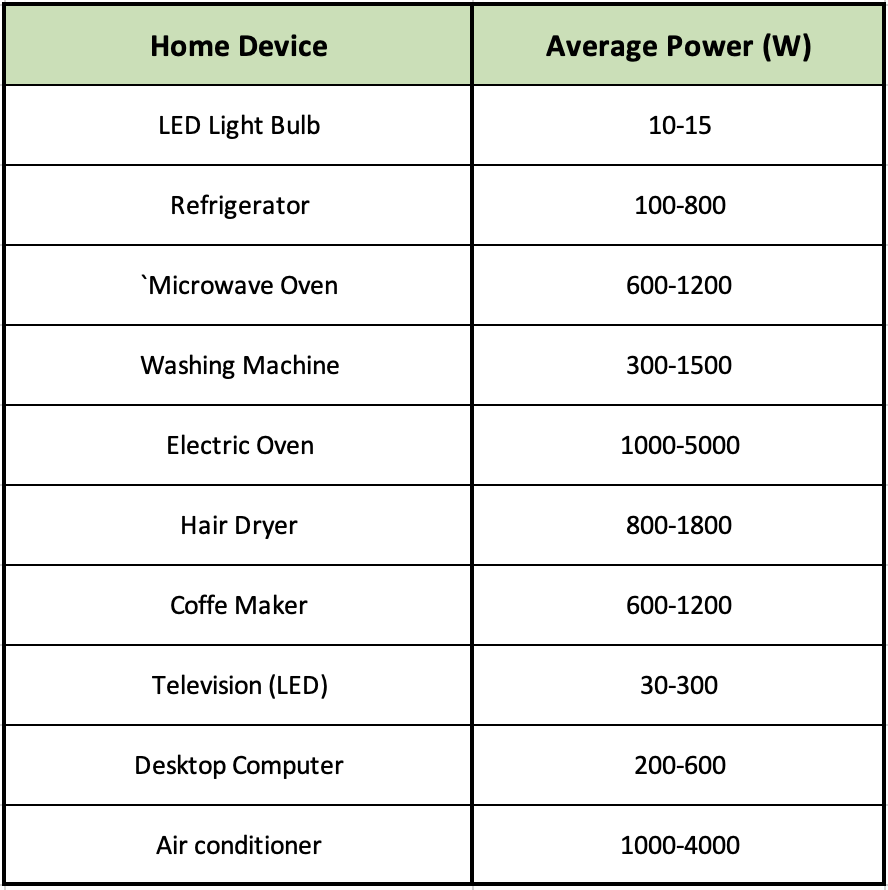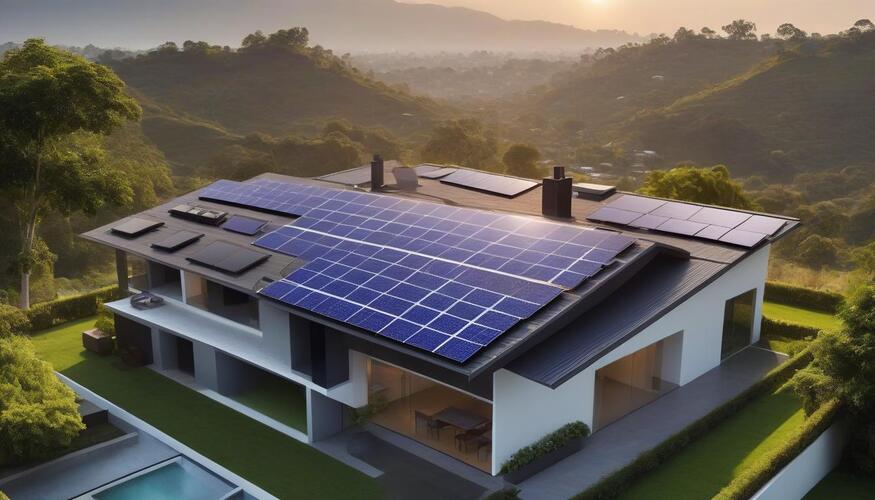If you’re considering investing in a solar generator for home, you’re on the path to enhancing your energy independence and sustainability. Solar generators offer a reliable source of backup power and can be a valuable addition to your home’s energy system. However, with numerous options available, choosing the right model can be challenging. This guide will help you navigate the key factors to consider, including power output, battery type, and solar panel compatibility, ensuring you make an informed decision that aligns with your needs and budget. Let’s dive into the essential aspects of selecting the best solar generator for home.
Table of Contents
Generator Power Output and Capacity
When choosing a solar generator for home, power output and capacity are two of the most critical factors to consider. The power output determines what appliances and devices the generator can run, while the capacity indicates how long it can power them before needing a recharge.
Most solar generators for home are rated in watts (W) for power output and watt-hours (Wh) for capacity. For example, a 1,000W generator can power devices that require up to 1,000 watts at a time. If the generator has a capacity of 2,000Wh, it means it can provide 1,000 watts of power for about two hours before the battery is depleted.
When considering power output, think about which appliances you need to run during a power outage or off-grid situation. Essential items like refrigerators, lights, and small electronics typically require lower wattage. However, more energy-demanding appliances like air conditioners or electric ovens will need higher power outputs.

Similarly, battery capacity is essential for determining how long you can rely on the generator. For example, if your refrigerator uses 100 watts and you have a generator with a capacity of 2,000Wh, it could run your fridge for around 20 hours. Always aim for a higher capacity if you need prolonged backup power.
Image Suggestion:
- A visual representation of a solar generator’s battery capacity in relation to common household appliances.
In summary, matching the solar generator for home to your specific power needs and duration of use is crucial. Ensure the power output can handle the appliances you plan to run, and the capacity is sufficient to keep them running for as long as you need.
Battery Type and Efficiency
The type of battery used in a solar generator for home greatly impacts its performance, lifespan, and efficiency. There are two main types of batteries found in solar generators: lithium-ion and lead-acid. Each has its pros and cons, so understanding the differences can help you choose the best option for your needs.
Lithium-ion batteries are the most common in modern solar generators. They are known for their high energy efficiency, lighter weight, and longer lifespan. Lithium-ion batteries have a higher energy density, meaning they can store more energy in a smaller, lighter package. They also tend to last longer with more charge cycles, making them a great long-term investment for home use.
Lead-acid batteries, on the other hand, are typically less expensive but bulkier and heavier. They have a shorter lifespan and fewer charge cycles compared to lithium-ion batteries. However, they are often used in larger, stationary solar generators that don’t need to be moved frequently. If you’re looking for a more budget-friendly option and portability isn’t a concern, lead-acid batteries can still be a viable choice for backup power.
Image Suggestion:
- A side-by-side comparison image of lithium-ion vs. lead-acid batteries, highlighting differences in weight, capacity, and lifespan.
Efficiency is another critical factor. Lithium-ion batteries are more efficient, often around 90-95%, meaning they lose less energy during charging and discharging. In contrast, lead-acid batteries typically have lower efficiency, around 70-80%. This means a solar generator for home with lithium-ion batteries will make better use of the energy it stores, providing more reliable power over time.
Image Suggestion:
- A graph showing the efficiency rates of lithium-ion vs. lead-acid batteries in solar generators.
In conclusion, if you want a solar generator for home that’s portable, long-lasting, and highly efficient, lithium-ion is the better choice. However, for those looking to save on upfront costs and don’t require mobility, lead-acid batteries can still provide adequate backup power.
Number and Types of Outlets
When selecting a solar generator for home, the number and type of outlets play a crucial role in determining its functionality and versatility. The variety of outlets available can dictate how many and what types of devices you can power simultaneously.
Most solar generators for home come with a range of outlet types, including:
- AC Outlets: These are standard household outlets that allow you to plug in appliances like refrigerators, TVs, or other high-wattage devices. The number of AC outlets can vary, so if you plan to power multiple large appliances, look for a generator with more AC ports.
- USB Ports: These are essential for charging small devices like smartphones, tablets, or portable gadgets. Many solar generators come with USB-A and USB-C ports, offering versatility for charging multiple devices without the need for adapters.
- DC Ports: These are ideal for powering 12V devices, such as car chargers or certain home appliances like fans. DC outlets can be highly useful for off-grid living and emergency power setups.
- Carport (12V Output): A carport outlet allows you to power devices like mini-fridges, portable air compressors, or other low-power 12V devices, which can be essential during outdoor or emergency situations.
Image Suggestion:
- A visual showing different types of outlets on a solar generator, clearly labeled AC, USB, and DC.
It’s important to consider the number of outlets as well. A solar generator for home with multiple AC outlets is beneficial if you plan on running several high-wattage appliances simultaneously. On the other hand, having several USB and DC ports ensures you can charge smaller devices without taking up the more powerful AC outlets.
Image Suggestion:
- A chart or table comparing the number and types of outlets for different solar generators.
In summary, a well-rounded solar generator for home should offer a variety of outlet types to accommodate your needs. Whether you’re powering essential home appliances during a blackout or charging smaller gadgets on the go, having the right outlets ensures you get the most out of your generator.
Solar Panels Type and Output Power
When choosing a solar generator for home, the type and power of the solar panels you pair with it are critical to its overall efficiency and charging speed. Solar panels convert sunlight into electricity, so selecting the right type and power rating can significantly impact the performance of your solar generator.
There are two main types of solar panels used with solar generators:
- Monocrystalline Solar Panels: These are known for their high efficiency and performance, especially in low-light conditions. Monocrystalline panels are typically more expensive but offer the best power output per square foot, making them ideal for homeowners with limited space or those looking to maximize efficiency.
- Polycrystalline Solar Panels: These are generally more affordable but slightly less efficient than monocrystalline panels. They are still a solid choice for most home applications, especially if you have ample space for installation. While they may require more surface area to generate the same amount of power, they remain a reliable option for powering a solar generator for home.
Image Suggestion:
- A side-by-side comparison of monocrystalline and polycrystalline solar panels, highlighting differences in efficiency and appearance.
In terms of power, solar panels are rated in watts (W), which measures their ability to generate electricity. For home use, most solar panels range between 100W to 400W. Higher wattage panels will charge your solar generator for home more quickly. For instance, a 200W solar panel will charge twice as fast as a 100W panel under optimal sunlight conditions. Therefore, selecting the right wattage is essential for meeting your home’s power needs, especially if you plan to use the generator during emergencies or off-grid living.
Image Suggestion:
- A chart showing the charging times of a solar generator with different wattage solar panels.
It’s also important to ensure that the solar panels you choose are compatible with your solar generator. Some generators come with proprietary panels, while others allow third-party solar panel connections. Always check the voltage and amperage compatibility to avoid underperformance or damage.
Image Suggestion:
- A visual representation showing the solar panel connections to a solar generator.
In summary, the type and power of solar panels you choose will directly affect the performance of your solar generator for home. Monocrystalline panels offer the highest efficiency, while polycrystalline panels provide a more cost-effective option. Selecting the right wattage ensures your generator charges effectively and meets your power requirements.
Price vs. Value
When evaluating a solar generator for home, understanding the balance between price and value is crucial for making an informed decision. Price is often the first factor considered, but value encompasses the overall benefits and features that justify the cost.
Price can vary significantly based on the solar generator’s brand, power output, battery type, and additional features. While a higher price often indicates better performance, efficiency, and durability, it doesn’t always guarantee the best value. It’s important to look beyond the price tag and assess what you’re getting in return.
Value involves evaluating several factors:
- Power Output and Capacity: A more expensive generator with higher power output and capacity may provide better performance and longer run times. Assess whether the additional cost translates to a noticeable improvement in your needs, such as running multiple appliances or extended backup times.
- Battery Type: Lithium-ion batteries, though pricier, offer greater efficiency and a longer lifespan compared to lead-acid batteries. Consider if the increased upfront cost is justified by the long-term benefits and reduced replacement frequency.
- Features and Extras: Additional features like multiple outlet types, higher solar panel compatibility, and enhanced durability contribute to the overall value. Compare these features to ensure you’re paying for benefits that align with your needs.
Image Suggestion:
- A comparison table showing different solar generators for home with their prices and key features.
- Warranty and Support: Higher-priced models often come with better warranties and customer support. Consider the value of having reliable service and support in case of issues or maintenance needs.
- Efficiency and Longevity: Evaluate how well the generator performs relative to its price. A more efficient and longer-lasting generator may offer better value over time, even if it costs more upfront.
Image Suggestion:
- A graph or chart showing the cost vs. value comparison, illustrating the long-term savings and benefits of higher-priced models.
In summary, when choosing a solar generator for home, it’s essential to weigh the price against the value it offers. Look for a balance between cost and features that meets your specific needs and provides long-term benefits. By considering power output, battery type, additional features, and warranty, you can make a more informed decision that maximizes your investment.
Choosing the right solar generator for home involves careful consideration of several factors to ensure you get the best performance and value for your needs. By evaluating key aspects such as power output and capacity, battery type and efficiency, the number and type of outlets, solar panel types and power, and the balance between price and value, you can make an informed decision that suits your home’s requirements.
Remember, a higher price doesn’t always equate to better value. Instead, focus on the features that align with your specific needs, whether it’s high power output for running multiple appliances or efficient battery types for long-term use. Assessing the compatibility of solar panels and the number of outlets available will also help you maximize the utility of your solar generator for home.
Investing in the right solar generator can enhance your home’s energy independence, provide reliable backup power, and contribute to a more sustainable lifestyle. By carefully comparing different models and understanding the balance between cost and benefits, you can select a solar generator that meets your expectations and offers long-term satisfaction.
Explore your options, evaluate the features that matter most, and choose a solar generator for home that will effectively support your energy needs while delivering the best value for your investment.


